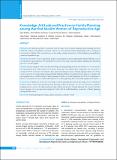Please use this identifier to cite or link to this item:
https://hdl.handle.net/20.500.14356/1273Full metadata record
| DC Field | Value | Language |
|---|---|---|
| dc.contributor.author | Dhakal, Usha | - |
| dc.contributor.author | Shrestha, Ram Bahadur | - |
| dc.contributor.author | Bohara, Surendra Kumar | - |
| dc.contributor.author | Neupane, Samir | - |
| dc.date.accessioned | 2023-05-04T07:07:42Z | - |
| dc.date.available | 2023-05-04T07:07:42Z | - |
| dc.date.issued | 2020 | - |
| dc.identifier.citation | DhakalU., ShresthaR. B., BoharaS. K., & NeupaneS. (2020). Knowledge, Attitude and Practice on Family Planning among Married Muslim Women of Reproductive Age. Journal of Nepal Health Research Council, 18(2), 238-242. https://doi.org/10.33314/jnhrc.v18i2.2244 | en_US |
| dc.identifier.issn | Print ISSN: 1727-5482; Online ISSN: 1999-6217 | - |
| dc.identifier.uri | http://103.69.126.140:8080/handle/20.500.14356/1273 | - |
| dc.description | Original Article | en_US |
| dc.description.abstract | Abstract Background: Maternal mortality is associated with the unmet need of family planning. Family planning has been subjected as taboos in the Muslim community with low use of its methods. Gulariya Municipality is the second largest community for Muslim. This research focuses on knowledge, attitude and practice of family planning among Muslim women of reproductive age. Methods: Descriptive cross-sectional study design was undertaken in Gulariya Municipality. Married Muslim women of reproductive age group from 164 households were interviewed using systematic random sampling. Key informant interview was also applied. Results: The percentage of women who have knowledge on family planning methods was found 94.5%. On the means of contraception, most of the women (73.2%) knew about Depo. The attitude of the respondents was seen positive. A total of 79.3% of women were found to have practiced temporary means of family planning while none of the women surveyed were found using permanent family planning methods. Association between all socio-economic and demographic factors with knowledge of family planning methods were found insignificant at 0.05 level of significance. However, association between wealth rank and practices on family planning shows statistically significant association. Conclusions: Majority of women have knowledge on family planning, but still lack knowledge on few method like condom. Most of them found practicing family planning, despite the practice was not seen being done regularly. Language barrier seems to be influencing knowledge, attitude and practice of family planning. The research warrants newer strategies to be developed and employed to deal with the multi-disciplinary prospective of family planning among Muslim women. Keywords: Family planning; knowledge, attitude and practice; muslim women | en_US |
| dc.language.iso | en | en_US |
| dc.publisher | Nepal Health Research Council | en_US |
| dc.relation.ispartofseries | Apr-June, 2020;2244 | - |
| dc.subject | Family planning | en_US |
| dc.subject | knowledge | en_US |
| dc.subject | attitude and practice | en_US |
| dc.subject | muslim women | en_US |
| dc.title | Knowledge, Attitude and Practice on Family Planning among Married Muslim Women of Reproductive Age | en_US |
| dc.type | Journal Article | en_US |
| local.journal.category | Original Article | - |
| Appears in Collections: | Vol. 18 No. 2 Issue 47 Apr-Jun 2020 | |
Files in This Item:
| File | Description | Size | Format | |
|---|---|---|---|---|
| 2244-Manuscript-17523-1-10-20200911.pdf | Fulltext Download | 231.91 kB | Adobe PDF |  View/Open |
Items in DSpace are protected by copyright, with all rights reserved, unless otherwise indicated.
